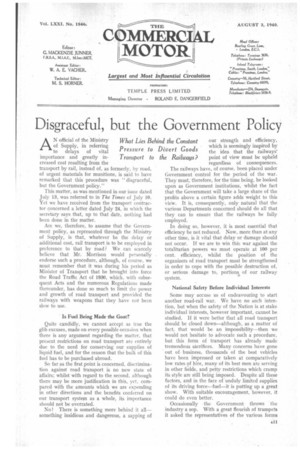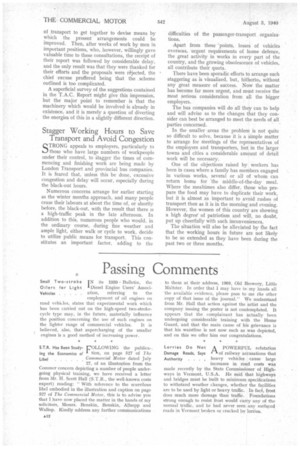Disgraceful, but the Government Policy
Page 13

Page 14

If you've noticed an error in this article please click here to report it so we can fix it.
N official of the Ministry of Supply, in referring to delays of vital importance and greatly increased cost resulting from the transport by rail, instead of, as formerly, by road, of urgent materials for munitions, is said to have remarked that this procedure was "disgraceful, but the Government policy."
This matter, as was mentioned in our issue dated July 13, was referred to in The Times of July 10. Yet we have received from the transport contractor concerned a letter dated July 24, in which the secretary says that, up to that date, nothing had been done in the matter.
Are we, therefore, to assume that the Government policy, as represented through the Ministry of Supply, is that, whatever be the delay or additional cost, rail transport is to be employed in preference to that by road? We can scarcely believe that Mr. Morrison would personally endorse such a procedure, although, of course, we must remember that it was during his period as Minister of Transport that he brought into force the Road Traffic Act of 1930, which, with subsequent Acts and the numerous Regulations made thereunder, has done so much to limit the power and growth of road transport and provided the railways with weapons that they have not been slow to use.
Is Fuel Being Made the Goat?
Quite candidly, we cannot accept as true the glib excuses, made on every possible occasion when there is any argument regarding the matter, that present restrictions on road transport are entirely due to the need for conserving our supplies of liquid fuel, and for the reason that the bulk of this fuel has to be purchased abroad.
So far as the first point is concerned, discrimination against road transport is no -new state of affairs; whilst with regard to the second, although there may be more justification in this, yet, compared with the amounts which we are expending in other directions and the benefits conferred on our transport system as a whole, its importance should not be overrated.
No! There is something more behind it all— something insidious -and dangerous, a sapping of our strength and efficiency, which is seemingly inspired by the idea that the railways' point of view must be upheld regardless of consequences.
The railways have, of course, been placed under Government control for the period of the war. They must, therefore, for the time being, be looked upon as Government institutions, whilst the fact that the Government will take a large share of the profits above a certain figure adds weight to this view. It is, consequently, only natural that the various Departments concerned should do all that they can to ensure that the railways be fully employed.
In doing so, however, it is most essential that efficiency be not reduced. Now, more than at any other time, is it vital that delay or damage should not occur. If we are to win this war against the totalitarian powers we must operate at 100 per cent. efficiency, whilst the position of the organizers of road transport must be strengthened in order to cope with the possible destruction of, or serious damage to, portions* of our railway system.
National Safety Before Individual Interests Some may accuse us of endeavouring to start another road-rail war. We have no such intention, but when the safety of the Nation is at stake individual interests, however important, cannot be studied. If it were better that all road transport should be closed down—although, as a matter of fact, that would be an impossibility then we would not hesitate to advocate such a procedure, but this form of transport has already made tremendous sacrifices. Many concerns have gone out of, business, thousands of the best vehicles have been impressed or taken at comparatively low rates of hire, many of its best men are serving in other fields, and petty restrictions which cramp its style are still being imposed. Despite all these factors, and in the face of unduly limited supplies of its driving force—fuel—it is putting up a great show. With suitable encouragement, however, it could do even better.
Occasionally the Government throws the industry a sop. With a great flourish of trumpets it asked the representatives of the various forms All of .transport to get together to devise means by which the present arrangements could be improved. Then, after weeks of work by men in important positions, who, however, willingly gave valuable time to these consultations, the receipt of their report was followed by considerable delay, and the only result was that they were thanked for their efforts and the proposals were rAjected, the chief excuse proffered being that the . scheme outlined is too complicated.
A superficial survey of the suggestions contained in the T.A.C. Report might give this impression, but the major point to remember is that the machinery which would be involved is already in existence, and it is merely a question of diverting the energies of this in a slightly different direction.
Stagger Working Hours to Save Transport and Avoid Congestion
STRONG appeals to employers, particularly to those who have large numbers of workpeople under their control, to tagger the times of commencing and finishing work are being made by London Transport and provincial bus companies. It is feared that, unless this be done, excessive congestion and delay will occur, especially during the black-out hours.
Numerous concerns arrange for earlier starting as the winter months approach, and many people cease their labours at about the time of, or shortly before, the black-out, with the result that there is a high-traffic peak in the late afternoon. In addition to this, numerous people who would, in the ordinary course, during fine weather and ample light, either walk or cycle to work, decide to utilize public means for transport. This constitutes an important factor, adding to the difficulties of the passenger-transport organizations.
Apart from these 'points, losses of vehicles overseas, urgent requirements of home defence, the great activity in works in every part of the country, and the growing obsolescence of vehicles, all contribute their quota.
There have been sporadic efforts to arrange such staggering as is visualized, but, hithertn, without any great measure of success. Now the matter has become far more urgent, and must receive the most serious consideration from all the bigger employers.
The bus companies will do all they can to help and will advise as to the changes that they consider can best be arranged to meet the needs of all parties concerned.
In the smaller areas the problem is not quite so difficult to solve, because it is a simple matter to arrange for meetings of the representatives of the employers and transporters, but in the larger towns and cities a considerable amount of detail work will be necessary.
One of the objections raised by workers has been in cases where a family has members engaged in various works, several or all of whom can return home for the middle-of-the-day meal. Where the mealtimes also differ, those who prepare the food may have to duplicate their work, but it is almost as important to avoid rushes of transport then as it is in the morning and evening. However, the women of this country are showing a high degree of patriotism and will, no doubt, put up cheerfully with such inconveniences.
The situation will also be alleviated by the fact that the working hours in future are not likely to be so extended as they have been during the past two or three months.




















































